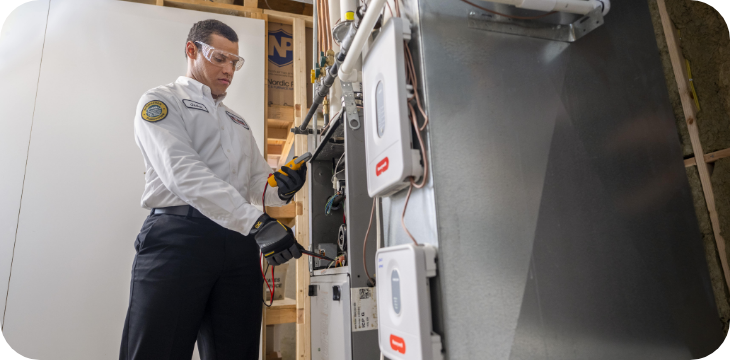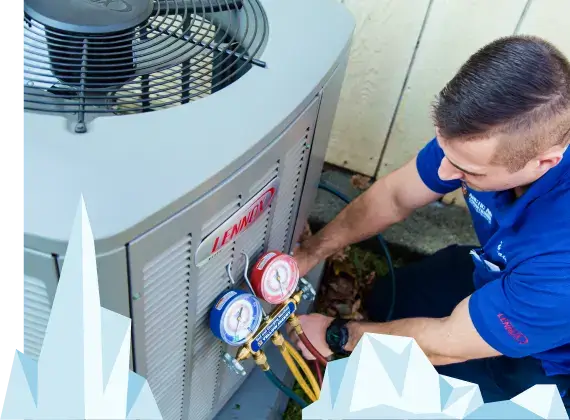Reliable Team at DMAKS HVAC for Complete Comfort.
Reliable Team at DMAKS HVAC for Complete Comfort.
Blog Article
Energy-Efficient A/c Equipments to Conserve on Energy Bills
As power expenses remain to climb, the relevance of energy-efficient heating and cooling systems becomes significantly obvious. These systems not only promise significant savings on energy expenses yet also add to a much more sustainable future by minimizing power consumption. With different options readily available, including geothermal warm pumps and ductless mini-splits, property proprietors face a multitude of selections that can enhance comfort and air high quality. Recognizing the vital features and maintenance requirements is necessary to making best use of these advantages. What factors should be prioritized when picking the right system for your requirements?
Advantages of Energy-Efficient A/c Solutions
Energy-efficient Cooling and heating systems use countless benefits that extend beyond simple cost savings. By eating less power, these systems contribute to reduce greenhouse gas discharges, assisting to deal with climate change and promote sustainability.
Furthermore, energy-efficient cooling and heating systems frequently give improved comfort levels. A lot of these systems include advanced modern technology that permits better temperature control and boosted air top quality (DMAKS HVAC). This results in a much healthier interior setting, which is particularly important for individuals with allergic reactions or respiratory concerns
In addition, buying energy-efficient cooling and heating systems can enhance property value. As even more consumers prioritize power efficiency, homes and structures equipped with these systems may draw in greater proposals in the realty market.
Sorts Of Energy-Efficient Cooling And Heating Options
Just how can property owners and services choose one of the most ideal energy-efficient a/c alternatives for their needs? The market offers a variety of energy-efficient heating and cooling systems, each made to boost convenience while minimizing energy usage.
One option is the variable refrigerant flow (VRF) system, which successfully manages the temperature in several zones within a structure. This system adapts its cooling agent flow to match the wanted temperature level, bring about considerable energy financial savings.
Another preferred option is geothermal heatpump, which make use of the earth's stable temperature to warm and awesome areas. By transferring warm to and from the ground, these systems demonstrate excellent efficiency, particularly in modest environments.
In addition, ductless mini-split systems give an energy-efficient option for homes lacking ductwork. These systems allow for zone-specific heating & cooling, minimizing energy waste in vacant areas.
Finally, high-efficiency heaters and ac unit, with advanced SEER and AFUE rankings, provide trusted environment control while eating much less power than conventional versions. By reviewing these alternatives, home owners and companies can select a HVAC system tailored to their particular requirements and energy efficiency goals.
Key Functions to Take Into Consideration

Following, examine the kind of compressor used in the system. DMAKS HVAC. Variable-speed compressors can readjust their result to match the home heating or cooling down need, causing boosted comfort and power financial savings compared to single-speed designs. In addition, seek systems furnished with smart thermostats that provide programmable settings and remote access, permitting for much better control over power intake
An additional essential feature is the system's air filtering capacity. High-efficiency filters can boost interior air quality and minimize power intake by making sure the system operates efficiently. Consider the kind of refrigerant used; modern systems often use environment-friendly cooling agents that have a reduced environmental effect.
Last but not least, ensure that the system is suitable with zoning innovation, which enables tailored temperature control in different locations of your home, improving convenience while decreasing power usage.
Tips for Selecting the Right System


Following, think about power performance ratings, specifically the Seasonal Power Efficiency Ratio (SEER) for cooling down systems and the Yearly Gas Application Effectiveness (AFUE) for heating unit. Higher ratings indicate higher effectiveness, which can lead to substantial financial savings on utility costs gradually.
Additionally, review the kind of heating and cooling system that best suits your way of life and spending plan. Options consist of air conditioning, ductless mini-splits, and heatpump, each with its very own set of benefits and drawbacks.
Don't overlook the relevance of appropriate installation and sizing; an inaccurately sized system can cause inefficiencies and boosted wear. Consult with a specialist HVAC specialist to obtain professional referrals tailored to your home's distinct demands. This comprehensive method will certainly make certain that you select an energy-efficient a/c system that fulfills your needs and budget plan successfully.
Upkeep for Optimum Performance
As soon as the right heating and cooling system remains in area, ongoing maintenance becomes crucial to making certain optimum efficiency and longevity. A well-kept system runs better, causing reduced power consumption and reduced utility bills. Regular evaluations and tune-ups must be set up at the very least two times a year-- as soon as prior to the air conditioning Learn More Here period and as soon as prior to the home heating season.

House owners should additionally be alert regarding checking their a/c system's efficiency. Uncommon noises, fluctuating temperature levels, or enhanced energy expenses can indicate underlying concerns that require prompt interest. By resolving these issues without delay, property owners can prevent costly repair work and extend the life-span of their systems.
Purchasing a maintenance strategy with a qualified specialist not just improves effectiveness but also gives comfort, recognizing that the system is running at its ideal. DMAKS HVAC. Routine upkeep is for that reason necessary for maintaining power effectiveness and minimizing general operational costs
Final Thought
Finally, energy-efficient a/c see here systems offer a viable remedy for reducing energy costs while improving comfort and air quality. By incorporating sophisticated innovations and options such see this as geothermal heatpump and ductless mini-splits, homeowner can accomplish substantial power savings and add to environmental sustainability. Mindful factor to consider of system attributes and recurring maintenance additionally makes sure optimum efficiency, making energy-efficient systems a prudent investment for both economic and eco-friendly benefits.
Report this page